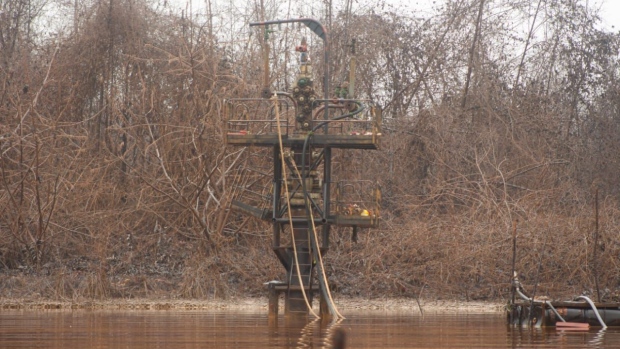Dec 9, 2021
Oil Spill Polluting Nigeria’s Waterways Took a Month to Stop
, Bloomberg News

(Bloomberg) -- An oil spill in southern Nigeria has been stopped after flowing into surrounding mangrove forests and water systems for over a month after the local company that operates the field struggled to contain it.
The well located in Bayelsa state and operated by Aiteo Eastern E&P Co. has been sealed, Idris Musa, director general of the National Oil Spill Detection and Response Agency, said by phone Wednesday. Efforts continue to recover the oil that poured into nearby waterways, he said.
Nigeria has suffered for decades from a legacy of environmental damage due to oil spills in the Niger Delta region, with the communities that live there seeking compensation from international operators. As oil majors transition to cleaner energy sources, assets are often sold to local companies.
The well blew on Nov. 1, according to Nigerian advocacy group Environmental Rights Action. Aiteo reported the leak to the national authorities on Nov. 5 and hired a unit of Halliburton Co. to bring the spill under control.
Having secured the well, clean up efforts to limit the spread of oil “will now be comprehensively escalated,” Victor Okoronkwo, Aiteo’s group managing director, said Thursday in a statement. “Efforts will further be channeled immediately into increasing remediation measures.”
The source of the leak was a non-producing well that had been capped. Nigeria’s government will now be able to determine the extent of the damage to the local environment and communities, Musa said. The cause of the rupture is still not known.
Aiteo acquired the field from a consortium of oil majors headed by Royal Dutch Shell Plc in 2015. The sale price of $2.4 billion for the permit and a pipeline is the largest paid so far by Nigerian companies acquiring assets from their international counterparts. It operates the license in a joint venture with the state-owned Nigerian National Petroleum Corp.
The field produced about 27,000 barrels per day in 2020, according to information published by NNPC. Output, which had dropped to about 9,500 barrels a day by July, is transported via a pipeline to Shell’s Bonny export terminal.
(Adds statement from company in fifth paragraph, detail and background throughout)
©2021 Bloomberg L.P.


